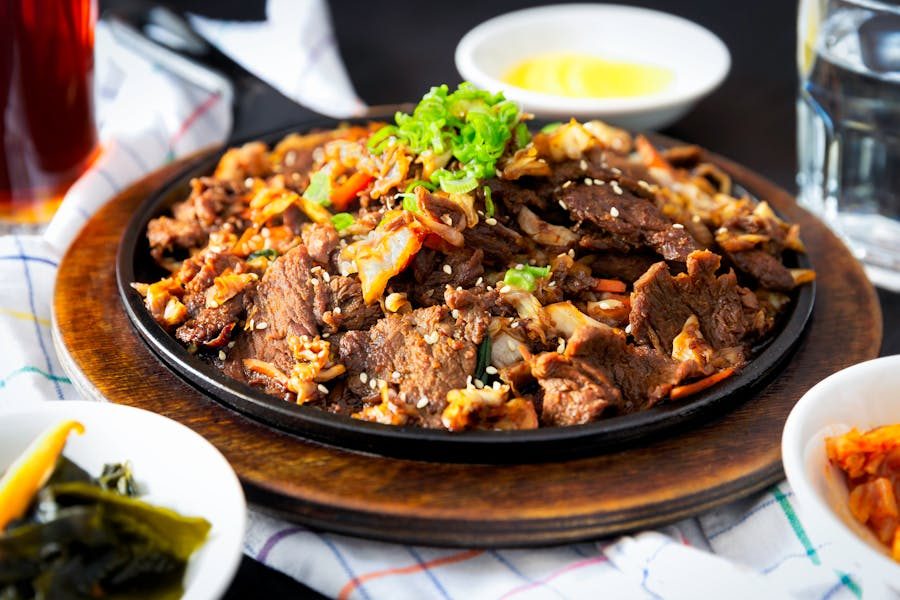


There are many nutritious meals for seniors.
Eating healthy, delicious meals is a critical part of daily life for seniors, especially those living in assisted living facilities.
As seniors age, their nutritional needs change and they require food that provides adequate nutrition to support their health and quality of life. However, planning and preparing nutritious meals tailored for seniors can be challenging.
This article provides tips and guidelines for serving tasty, nourishing meals to seniors in assisted living communities.

Adequate nutrition is essential for seniors to maintain their health and independence. Malnutrition is a common problem among older adults and can lead to muscle loss, decreased bone density, impaired immune function, and greater risk of chronic illnesses.
Seniors often have decreased appetite and difficulty chewing or swallowing food, putting them at higher risk for nutritional deficiencies.
Eating nourishing meals is also important for cognitive health and can help prevent or delay Alzheimer’s disease and dementia.
Research shows that the Mediterranean diet, with its emphasis on vegetables, fruits, whole grains, legumes, fish and healthy fats like olive oil, may boost brain health in older adults.
For seniors in assisted living facilities, meals may be one of the highlights of their day. Eating provides social opportunities to gather with other residents and builds community.
Seniors who enjoy shared meals with others tend to have better nutrition.

Here are some tips for planning and serving delicious, nourishing meals tailored for seniors:
Seniors often experience decreased sense of taste and smell. To make foods more palatable, season them well with herbs, spices, citrus, vinegar and other flavor-boosting ingredients.
Use both sweet and savory flavors to make dishes more appealing.
Altering texture also helps. Make foods easier to chew by chopping, mincing, pureeing or mashing. Serve broth-based soups, stews with tender meats and vegetables, and casseroles with well-cooked ingredients.
Avoid dry, tough foods.
Fiber keeps digestion regular and protein provides essential nutrients for maintaining muscle mass. Good sources of fiber include fruits, vegetables, whole grains, beans and lentils. Choose protein-rich foods like eggs, dairy, poultry, fish, beans, nuts and seeds.
Seniors often don’t eat enough produce. Brightly colored fruits and veggies provide vitamins, minerals and antioxidants. Offer salads with mixed greens, sliced fruits with yogurt, roasted veggies and fresh fruit as dessert. Puree fruits and make smoothies for easy consumption.
Dehydration is common among the elderly. Offer water and other hydrating beverages like herbal tea, diluted juices and broth-based soups. Integrate hydrating fruits and veggies like watermelon, cucumber and celery. Limit caffeine and alcohol which can have a diuretic effect.
Many older adults need to restrict sodium due to hypertension and other health conditions. Use herbs, spices, citrus and vinegars to flavor foods instead of salt. Limit processed foods, which often have high sodium content.
Incorporate a variety of brightly colored fruits, vegetables, beans and whole grains to add eye-appeal and vital nutrients to meals. Vary the colors on the plate for visual appeal.
Some seniors have trouble chewing and swallowing, putting them at risk for choking. Prepare foods that are soft, tender and easy to eat. Use ground or pureed meats, mashed vegetables and soft cooked grains. Modify food and liquid consistency as needed. Be attentive during meals to ensure safety.

Certain vitamins and nutrients deserve special attention when planning meals for the elderly. Here are some to focus on:
Seniors need protein for preserving muscle mass and strength. Include high-quality protein at each meal, like eggs, dairy, poultry, fish and plant-based proteins like beans, lentils and nuts. Spread protein intake throughout the day.
These nutrients strengthen bones and prevent osteoporosis. Include dairy products, calcium-fortified plant milks, leafy greens, salmon and fortified cereals. Older adults may need supplements to reach optimal intake.
Vitamin B12 deficiency is common in the elderly and can impair brain function. Animal foods are the best sources, like meat, eggs, dairy and fish. Vegetarians may need supplements.
Important for immune function and antioxidant protection. Include citrus fruits, berries, tomatoes, peppers and leafy greens.
Prevents constipation and benefits digestion. Emphasize whole grains, fruits, vegetables, beans, nuts and seeds. Stay hydrated.
These compounds fight cellular damage from free radicals and inflammation. Focus on deeply colored produce like leafy greens, berries and tomatoes. Nuts, seeds and spices also provide antioxidants.
Support heart and brain health. Include fatty fish like salmon twice a week. Plant sources like walnuts, flaxseeds and chia seeds are also good options.

Here is a sample one-day menu that highlights delicious, nutritious options for seniors:

For staff members responsible for planning and serving meals in assisted living communities, here are some key tips:
With careful menu planning, tasty preparation and attentive service, assisted living staff can provide seniors with delicious, nourishing meals tailored for their unique needs. Proper nutrition is key for supporting seniors’ health, quality of life and independence.

As mentioned at the beginning of this article, nutritious meals for seniors need to be a part of every day life. Eating well will help keep your loved ones body in the best possible health.
It can be challenging for seniors who are used to a certain eating pattern, but over time, you should be able to adjust meals to their liking.
For those considering an assisted living facility for their loved one, make sure double check that a facility has proper meal planning for its residents.
It is also a good idea to have a talk with the nutritionist, or other person in charge of what the residents eat. If your loved one has any special eating needs, that should be brought up, as well.
******************
If you want to learn more about meals for seniors with Alzheimer’s and other dementia, call (303) 956-9037 or drop by Applewood Our House at our Golden, Arvada, or Lakewood, Colorado homes for more information.